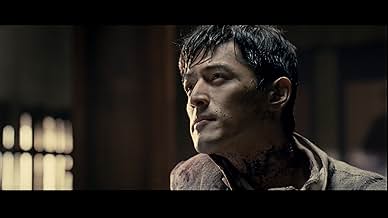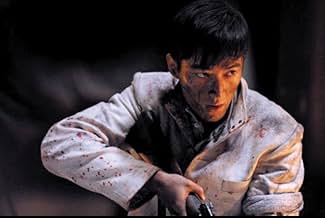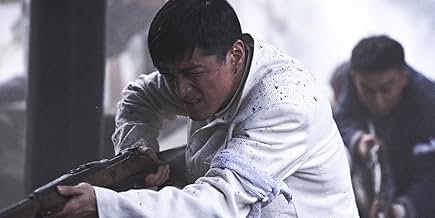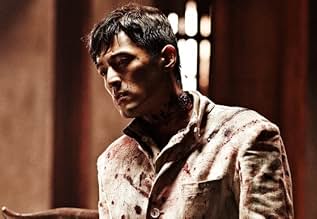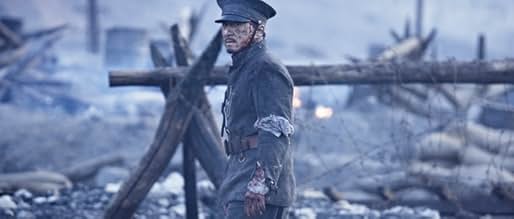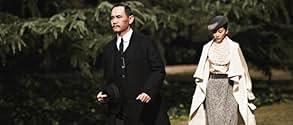IMDb RATING
5.7/10
6.6K
YOUR RATING
A historical drama based on the founding of the Republic of China when nationalist forces led by Sun Yat-sen overthrew the Qing Dynasty.A historical drama based on the founding of the Republic of China when nationalist forces led by Sun Yat-sen overthrew the Qing Dynasty.A historical drama based on the founding of the Republic of China when nationalist forces led by Sun Yat-sen overthrew the Qing Dynasty.
- Awards
- 6 wins & 7 nominations
Bingbing Li
- Xu Zonghan
- (as Bingbing Lee)
Jaycee Cho-Ming Chan
- Zhang Zhenwu
- (as Jaycee Chan)
Yu-Hang To
- Xiong Bingkun
- (as Dennis To)
Duobujie
- Feng Guozhang
- (as Duobuji)
Storyline
Did you know
- TriviaJackie Chan's one hundredth movie.
- GoofsWhen the revolutionary leader is on the ocean liner heading for China, the lifeboats on deck are too modern: they are painted bright orange and have built-in engines (note the propellers). The movie is set in 1911, so none of these characteristics would be present. Lifeboats of that era were rowboats, usually painted white.
- Quotes
Sun Yat-Sen: The goal of revolution isn't death, but to change fate. Young people are sacrificing themselves for the revolution, so that the living can lead better lives.
- Alternate versionsThe original version has a run time of 121 minutes. The more common release is only 99 minutes long
Featured review
This film in a word is a mess.
The problem with a lot of historical dramas in general is that their historical scopes are too big to fit neatly into the format of a film. 1911 suffers the same weakness as many other recent "propaganda" movies from mainland China: Irrespective of their propagandistic flairs or contents, they are all trying to cover everything and quickly into a usual 2 hrs duration, a task impossible if not improbable to do well. One has to question how much creative freedom Jackie really had with directing it but even without outside pressure, we can intuit that even Jackie won't want to be liberal with a source material so sensitive and "weighty".
I am not going to delve into the history as you can find better information elsewhere but judging this historical film purely as film, it is unsatisfactory at best. If you want to learn about the 1911 Revolution then perhaps this film would give you a rundown of its historical development; it is mostly centred from the perspective of the revolutionary faction led by Dr. Sun Yat Sen, the founding father of modern nationhood and democracy in China.
As required, you would see plenty of explosions and scenes of war, albeit distributed rather evenly throughout the film, providing as bits of "action" before or after the "civil" and political acts by Sun Yat Sen and the other "players" in the political manoeuvres. The film is littered with bits of textual information supposed to fill you in on the historical facts and significances, but if you are not a fast reader, all of it would fly past your head unless you are a professor in the study of the Revolution. So right off the bat you are witnessing an educational material that lacks substance and depth but only provides you with a general picture and even incomplete at that.
With the typical colour filtering for battle scenes, you are treated with the usual grittiness of war. It is very apparent you are supposed to feel the up welling of emotion as men and women sacrificed their lives for the revolution but if anything, the scenes are so short that before you have the chance/time for up welling, it is over. All we know is that battles were fought, people died, and we move on to the (politic) next part. As a historical book, that is fine, as a movie, it does not work. (Granted some scenes might have been touching but within a film world crammed up with similar attempts at dragging out your inner weak spots, we are emotionally fatigued at best to be moved so easily.)
One would also be appalled at the film's treatment of westerners. They are stereotyped/caricatured and acted awkwardly, seemingly only needed for their appearances and that none of the people hired to act knows how to act. (I mean come on, this is the 21th century, aren't we smart enough now to see through all the old stereotypes and know that people aren't paper cutouts?)
Along with that comes some bad acting on the part of the Chinese casts, where most of them are either wooden or overly melodramatic, some even managed both. Even the Doctor at certain parts of the movie came out awkwardly.
Cinematography. This might be much more centred on my own personal opinion but I find some of the cuts and techniques trying too hard, focusing on style rather than lending itself to the story and the scenes. A lot of potentially good scenes are ruined by fast cuts and awkward transitions which in some cases even provide some hilarious results on a film so centred on seriousness, making it somewhat a deadpan.
I applaud Jackie for taking on directing but maybe perhaps this is not exactly the source material to work with. Personally I find historical films problematic in ways of execution, especially one about politics and dare I say revolutions? There is no way not to read a film like this in propagandistic terms. But then again can there be politic without propaganda? Maybe this one could be read as an irony? The solution to this is: Just don't take on so much, stop making epic political movies all together and give us something much more substantial than the emotionless husks we are always being offered in, dare I say, "sanctioned" art? (But in the case of China, this might be harder than one could imagine.) It is much better to focus on the smaller characters tangled within all these big events, see things from their eyes and get to understand the big picture. The detachment from human emotionality and focusing on the large picture history book-esque is only going to alienate people. For this story, as much as the personage of the doctor is "monumental" and of his endeavours, focus on Sun Yat Sen himself more, his personal struggles, what happens behind doors. Granted this would basically take the film into another direction but political epics just do not work.(At least I haven't seen it work. Western directors already understood the difficulty and infeasibility of trying to cover everything at once. Personally I haven't seen any western films done this way or similarly. If you have seen a successful one, please let me know, I want to learn.)
If a metaphor could be used for this film, then it is akin to watch the scenes outside a fast moving train. Some scenes are nicely shot, well acted, and some sidelined characters having much more commanding presence than the main ones (In this case, I am speaking to the limited screen time roles played by Joan Chen as Empress Dowager Longyu and Chun Sun as Marshal Yuan Shi Kai), but the train is just going too fast for you to take a good look. All this makes you rather be out there...
The problem with a lot of historical dramas in general is that their historical scopes are too big to fit neatly into the format of a film. 1911 suffers the same weakness as many other recent "propaganda" movies from mainland China: Irrespective of their propagandistic flairs or contents, they are all trying to cover everything and quickly into a usual 2 hrs duration, a task impossible if not improbable to do well. One has to question how much creative freedom Jackie really had with directing it but even without outside pressure, we can intuit that even Jackie won't want to be liberal with a source material so sensitive and "weighty".
I am not going to delve into the history as you can find better information elsewhere but judging this historical film purely as film, it is unsatisfactory at best. If you want to learn about the 1911 Revolution then perhaps this film would give you a rundown of its historical development; it is mostly centred from the perspective of the revolutionary faction led by Dr. Sun Yat Sen, the founding father of modern nationhood and democracy in China.
As required, you would see plenty of explosions and scenes of war, albeit distributed rather evenly throughout the film, providing as bits of "action" before or after the "civil" and political acts by Sun Yat Sen and the other "players" in the political manoeuvres. The film is littered with bits of textual information supposed to fill you in on the historical facts and significances, but if you are not a fast reader, all of it would fly past your head unless you are a professor in the study of the Revolution. So right off the bat you are witnessing an educational material that lacks substance and depth but only provides you with a general picture and even incomplete at that.
With the typical colour filtering for battle scenes, you are treated with the usual grittiness of war. It is very apparent you are supposed to feel the up welling of emotion as men and women sacrificed their lives for the revolution but if anything, the scenes are so short that before you have the chance/time for up welling, it is over. All we know is that battles were fought, people died, and we move on to the (politic) next part. As a historical book, that is fine, as a movie, it does not work. (Granted some scenes might have been touching but within a film world crammed up with similar attempts at dragging out your inner weak spots, we are emotionally fatigued at best to be moved so easily.)
One would also be appalled at the film's treatment of westerners. They are stereotyped/caricatured and acted awkwardly, seemingly only needed for their appearances and that none of the people hired to act knows how to act. (I mean come on, this is the 21th century, aren't we smart enough now to see through all the old stereotypes and know that people aren't paper cutouts?)
Along with that comes some bad acting on the part of the Chinese casts, where most of them are either wooden or overly melodramatic, some even managed both. Even the Doctor at certain parts of the movie came out awkwardly.
Cinematography. This might be much more centred on my own personal opinion but I find some of the cuts and techniques trying too hard, focusing on style rather than lending itself to the story and the scenes. A lot of potentially good scenes are ruined by fast cuts and awkward transitions which in some cases even provide some hilarious results on a film so centred on seriousness, making it somewhat a deadpan.
I applaud Jackie for taking on directing but maybe perhaps this is not exactly the source material to work with. Personally I find historical films problematic in ways of execution, especially one about politics and dare I say revolutions? There is no way not to read a film like this in propagandistic terms. But then again can there be politic without propaganda? Maybe this one could be read as an irony? The solution to this is: Just don't take on so much, stop making epic political movies all together and give us something much more substantial than the emotionless husks we are always being offered in, dare I say, "sanctioned" art? (But in the case of China, this might be harder than one could imagine.) It is much better to focus on the smaller characters tangled within all these big events, see things from their eyes and get to understand the big picture. The detachment from human emotionality and focusing on the large picture history book-esque is only going to alienate people. For this story, as much as the personage of the doctor is "monumental" and of his endeavours, focus on Sun Yat Sen himself more, his personal struggles, what happens behind doors. Granted this would basically take the film into another direction but political epics just do not work.(At least I haven't seen it work. Western directors already understood the difficulty and infeasibility of trying to cover everything at once. Personally I haven't seen any western films done this way or similarly. If you have seen a successful one, please let me know, I want to learn.)
If a metaphor could be used for this film, then it is akin to watch the scenes outside a fast moving train. Some scenes are nicely shot, well acted, and some sidelined characters having much more commanding presence than the main ones (In this case, I am speaking to the limited screen time roles played by Joan Chen as Empress Dowager Longyu and Chun Sun as Marshal Yuan Shi Kai), but the train is just going too fast for you to take a good look. All this makes you rather be out there...
- How long is 1911?Powered by Alexa
Details
Box office
- Budget
- $18,000,000 (estimated)
- Gross US & Canada
- $135,739
- Opening weekend US & Canada
- $55,850
- Oct 9, 2011
- Gross worldwide
- $3,807,134
- Runtime1 hour 39 minutes
- Color
- Sound mix
- Aspect ratio
- 2.35 : 1
Contribute to this page
Suggest an edit or add missing content



